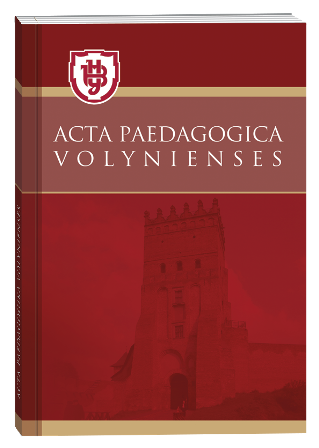АДАПТАЦІЯ НАУКОВОГО ТЕКСТУ ЯК ЕФЕКТИВНИЙ СПОСІБ ФОРМУВАННЯ ПРОФЕСІЙНОЇ КОМУНІКАЦІЇ ЗДОБУВАЧІВ ВИЩОЇ ОСВІТИ
DOI:
https://doi.org/10.32782/apv/2025.3.22Ключові слова:
науково-навчальний текст, адаптація, професійна комунікація, парафрастичність, діалогічність, лексико-семантичний перекладАнотація
У статті відзначено, що процес формування професійного мовлення перебуває у фокусі дослідницької уваги науковців, оскільки його ефективність визначає кар’єрне зростання фахівця. Автор зауважує, що основою наукового дискурсу фаху є передусім науково-навчальні тексти як жанровий різновид наукового викладу, мовний стандарт яких формують такі ознаки, як точність, логічність, послідовність, інформативність, композиційна чіткість, емоційна і суб’єктивно-оцінна нейтральність, однозначність, експліцитність, парафрастичність, діалогічність та ін. Предметом дослідницької уваги авторки стали два останні, у зв’язку з чим мета наукової розвідки – схарактеризувати парафрастичність та діалогічність наукового тексту як ефективний спосіб його адаптації з метою формування професійної комунікації здобувачів вищої освіти. Складність сприйняття, розуміння, інтерпретації та відтворення науково-навчальних текстів авторка пов’язує із такими стильовими домінантами, як-от: високий ступінь абстрактності, концентрація термінологічної лексики, що нерідко має неоднозначну інтерпретацію, складність індивідуально-авторського викладу. Це визначає завдання викладача-мовника – адаптувати зміст і структуру таких текстів відповідно до потреб здобувачів вищої освіти з урахуванням рівня їх мовної та професійної підготовки. Оптимізувати цей процес авторка пропонує шляхом інтерпретації складних понять через посередництво їх лексико-семантичного перекладу, коментування на основі словотвірної мотивації, етимологічної або історико-хронологічної довідок. Активізацію ж мисленнєвої діяльності здобувачів освіти авторка пов’язує із використанням словесно-образних унаочнень, які уможливлюють представлення виучуваного матеріалу в асоціативній формі, що увиразнює його прагматичну спрямованість на здобувача освіти як споживача наукової інформації. Доступності науково-навчальних текстів сприяють і прийоми їх діалогізації, з-поміж яких авторка виокремлює запитання, що привертають увагу до ключових компонентів, які визначають перспективу наукового викладу, покликання на думку авторитетних науковців та повтори мовленнєвого відрізка, що увиразнюють суть повідомлення і визначають його комунікативну спрямованість, сприяючи формуванню текстотвірної компетентності здобувачів освіти й активізуючи їх пізнавальні інтереси.
Посилання
Бабич Н. Д. Культура фахового мовлення. Чернівці : Книги – ХХІ, 2005. 496 c.
Баландіна Н. Навчальний текст: проблема визначення, типологія, функції. Філологічні науки. 2013. № 14. С. 88–94.
Дядюра Г. М. Функціональні параметри образності в науковому стилі (на матеріалі текстів природничих та технічних наук) : автореф. дис. … канд. філол. наук: спец. 10.02.01 – українська мова. Київ, Ін-т укр. мови НАН України, 2001. 18 с.
Д’яков А. С., Кияк Т. Р., Куделько З. Б. Основи термінотворення: семантичні та соціолінгвістичні аспекти. Київ : Вид. дім «КМ Academia», 2002. 218 с.
Колеснікова І. А. Лінгвокогнітивні та комунікативно-прагматичні параметри професійного дискурсу : авто-реф. дис. … д-ра філол. наук: спец. 10.02.15 «Загальне мовознавство». Київ, 2009. 27 с.
Кочан І. Динаміка і кодифікація термінів з міжнародними компонентами у сучасній українській мові. Львів : Вид. центр ЛНУ ім. І. Франка, 2004. 520 с.
Маслова Т. Б. Типологія наукового дискрсу в сучасній мовознавчій парадигмі. Англістика та американістика. 2013. Вип. 10. С. 39–43.
Мацько Л. І., Кравець Л. В. Культура української фахової мови : навч. посіб. Київ : Академія, 2007. 360 с.
Микитюк О. Сучасна українська мова: самобутність, система, норма : навч. посіб. Львів, 2023. 440 с.
Мойсеєнко С. М. Комунікативно-прагматичні особливості наукового тексту. Науково-методичні проблеми підготовки іноземних громадян : матер. Х Міжнар. наук.-практ. конф. (20–21 квітня 2017 р., м. Київ). Київ : Вид-во НАУ, 2017. С. 84–85.
Овсієнко Л. М. Науковий текст як лінгвістична одиниця і комунікативний феномен. Педагогічні науки : зб. наук. пр. Херсон : ХДУ, 2011. Вип. LХ. С. 125–128.
Онуфрієнко Г. С. Науковий стиль української мови. Київ : Центр навчальної літератури, 2006. 312 с.
Пентилюк М. І. Когнітивно-комунікативна модель удосконалення професійної культуромовної компетентності студентів філологічного профілю. Наукові записки Національного університету «Острозька академія». Серія «Філологічна». 2013. Вип. 40. С. 160–166.
Пономарів О. Д. Культура слова. Мовностилістичні поради : навч. посіб. Київ : Либідь, 2001. 240 с.
Сагач Г. Ділова риторика: мистецтво риторичної комунікації. Київ : Зоря, 2003. 255 с.
Семеног О. М. Науковий текст як засіб професійної самореалізації дослідника. Педагогічні науки: теорія, історія, інноваційні технології : наук. журнал. Суми : СумДПУ ім. А. С. Макаренка, 2012. № 7 (25). С. 286–294.
Стахів М. Український комунікативний етикет : навч.-метод. посіб. Київ : Знання, 2008. 245 с.
Степаненко М. Українська мова за професійним спрямуванням : підручник. Київ : Алерта, 2023. 536 с.
Струганець Л. В. Динаміка лексичних норм української літературної мови ХХ століття. Тернопіль : Астон, 2002. 352 с.
##submission.downloads##
Опубліковано
Як цитувати
Номер
Розділ
Ліцензія

Ця робота ліцензується відповідно до Creative Commons Attribution 4.0 International License.







